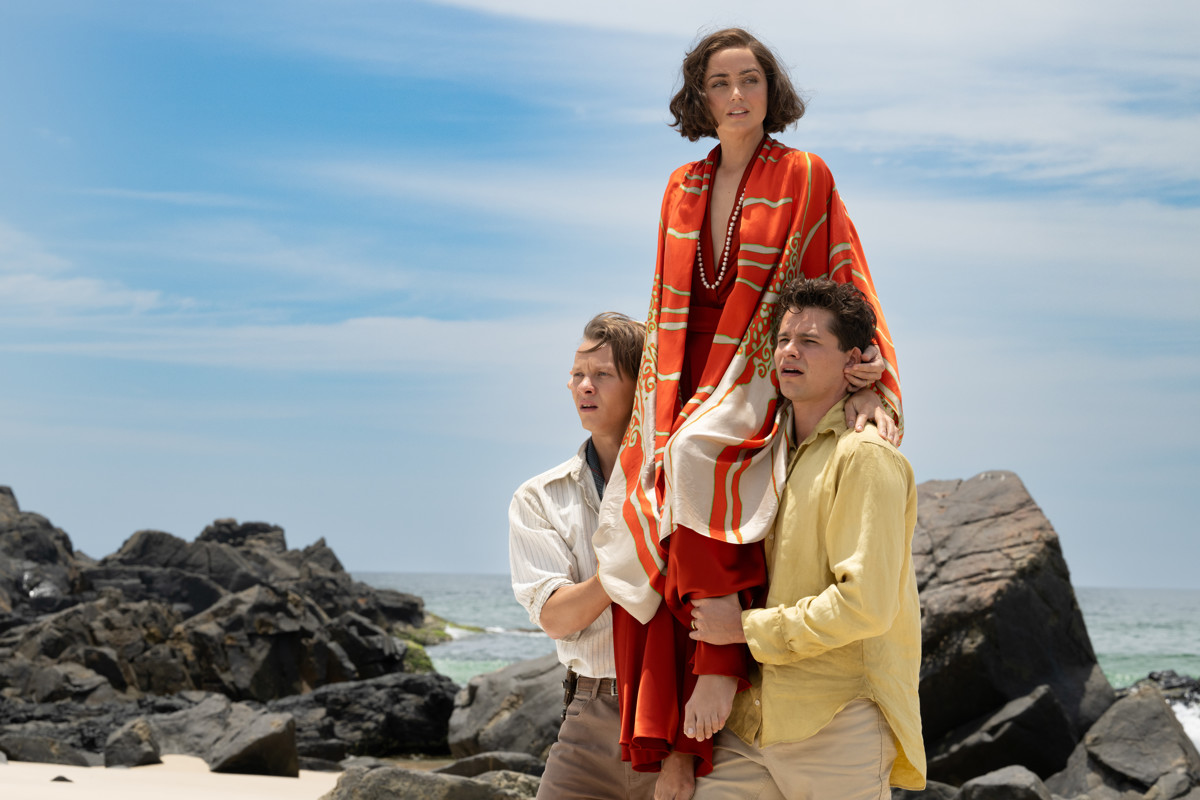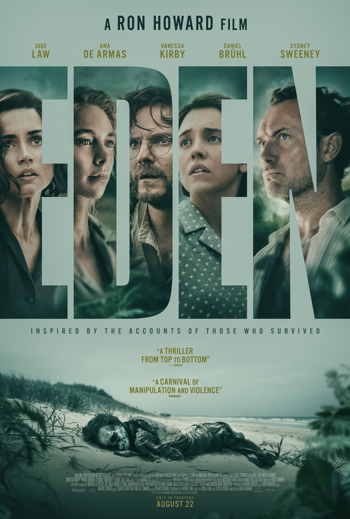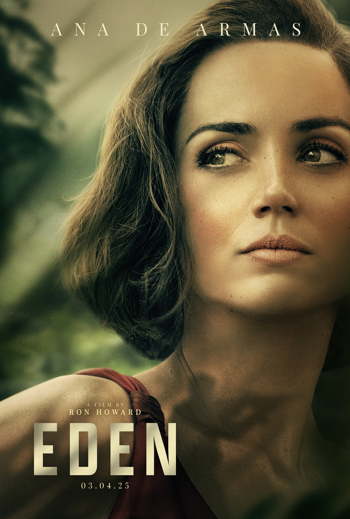Movies

New Releases • A-D • E-H • I-P • Q-Z • Articles • Festivals • Interviews • Dark Knight • Indiana Jones • John Wick • MCU
 Baroness Eloise (Ana de Armas) arrives on Floreana in grand style
Baroness Eloise (Ana de Armas) arrives on Floreana in grand style
Photo: Vertical
Eden
Directed by Ron Howard
Rated R
Isolated 22 August 2025
#EdenMovie
Eden, one of Ron Howard’s best movies, will never get the attention it deserves.
Hacienda Paradiso

Sometimes a movie’s great by the sheer brute force of its ideas. In Eden, there is such a densely packed multiplicity of thoughts and themes, it easily laps multiple times over summer fare like Fantastic Four: The First Steps and James Gunn’s Superman combined.
Sealing the deal, Eden is "inspired by the accounts of those who survived."
Yes. Eden is a true tale of survival that makes the reality TV of Survivor look like nothing more than a cosmetic farce. Sure, there are the requisite embellishments, but this story’s quite a ride.
First, let’s start with the cast. Incredible.
Jude Law (The Talented Mr. Ripley) boldly goes full-frontal as Dr. Friederich Ritter, the founder of a colony built for two on Floreana, a Galapagos Island.
Vanessa Kirby creates a wholly different kind of character from the glossy sheen of her roles in Mission: Impossible and Fantastic Four. Dore is Friederich’s partner. Not his wife. Hell no. She says marriage makes people sick. As it is, she’s enduring multiple sclerosis amid the rigors of their harsh island life.
Daniel Bruhl (Rush) is terrific as Heinz, a simple family man seeking a new, safe start for his family in an increasingly dangerous world.
But, much more importantly, two of the world’s most beautiful women – two women who are seemingly relentlessly hounded by a ridiculously judgmental society overrun by jealous weaklings and over-educated twits – both shine with remarkably contrasting performances. Their characters are diametrically opposed in virtually every way.
One, the Baroness Eloise (Ana de Armas, Ballerina), is a radiant high society dreamer with an ego that can overwhelm a room. The other, Margret (Sydney Sweeney, American Eagle genes… I mean "jeans," anybody?), is virtually egoless, a stepmother to a boy with tuberculosis who learns she herself is expecting a baby after she arrives on Floreana with her husband, Heinz.
Both de Armas and Sweeney are stunning, with de Armas especially showing her range more than she’s typically allowed.
Don’t Shoot the Typewriter
Ultimately, with the world’s economy collapsing, they’re all on the run from fascist Germany and other forces as the Great War – the War to End All Wars – segues from a very tentative peace to the rise of Adolf Hitler and a world set ablaze in incomprehensible horrors.
The opening title cards set the stage.
It’s 1929 and Dr. Ritter is on a mission to craft a new philosophy to save humanity from itself.
Such noble intentions. And yet, stunningly, without a single shred of altruism to be found anywhere between him and Dore.
Isla Floreana isn’t welcoming to human life. It’s a fixer-upper of an island rife with challenges to the very notion of surviving day by day. This province of Ecuador is where Charles Darwin conducted some of his studies and it’s a fitting location for a story that transcends notions of the survival of the fittest and dives deeper into the nature of people.
On the bright side, at least they no longer need to choose between paying rent and buying food.
Dr. Ritter – himself quite a forceful writer – drops letters into a barrel-shaped mailbox. Those letters are picked up by the occasional shipping vessel. Serving as updates to the world on his progress, some of those letters make their way into newspapers, informing a hopeful public of the latest in the doctor’s lofty aspirations on a distant island sheltered from politics, greed, power struggles, food rationing and the other troubles of the world at large.
Or so it would seem.
From that angle, it sounds so idyllic.
Don’t Kill the Burro
Earlier this summer, Don’t Let’s Go to the Dogs Tonight revisited the tumult of Rhodesia in the 1980s, as told through the memoirs of a woman whose childhood was colored by the experiences. Some of the same themes of basic humanity (or the lack thereof) permeate both movies.

One of the many fascinating aspects of Eden, though, is the small group of people involved and the dynamic range of eccentricities and other traits they represent. Friederich and Dore are hardcore experimentalists looking for a better path for all society. Heinz and Margret are relatively innocent, salt of the earth people looking to make a better life for their family, having been inspired by the newspaper stories of Friderich’s adventure.
Of course, the two parties clash. It’s much like – as with Don’t Let’s Go to the Dogs Tonight – the fictional story Paul Theroux crafted in The Mosquito Coast. It’s about people going to great lengths to fulfill a wild dream. Intruders aren’t welcome. They alter the course of the experiment by their mere presence. They drain the already limited resources.
And then there’s Baroness Eloise. As soon as her crew carry her ashore and set her on the sand, she brings a wholly different kind of energy to Floreana. She’s a walking grenade with the pin pulled as she seeks to fulfill her dream: to build an exclusive hotel catering to millionaires only.
Everything about her and her bacchanal ways stand in stark contrast to the other groups.
But then there’s a fourth party, one that makes a semi-regular visit. That’s led by George Allan Hancock (Richard Roxburgh, Moulin Rouge!). At one point he tells Eloise, "I own Hollywood, ma’am." And he wasn’t even bragging. He’s an American explorer, oil magnate, land developer and movie director who’s merely truth telling as he explains he owns 10,000 acres from the LaBrea tar pits to Laurel Canyon.
One of Eloise’s lovers / servants / colleagues tells of how she learned everything from the movies, and he describes her as a black hole sucking in everything in her orbit. Nonetheless, he says her love is intoxicating, it gives your life a divine purpose.
But Allan will have none of it. He knows she’s merely an actress on the world’s stage and he’s not interested in her schemes. But, nonetheless, his visits provide film footage of the group and their (miserable) island lives.
Don’t Kill Each Other
The three camps of idealists fall into a dance of manipulation, theft and duplicity that leads to murder. While baby makes 10, by the time all’s said and done, five people will meet a grisly demise in one way or another.
Howard – working with a screenplay by Noah Pink (Tetris), ostensibly based on the conflicting memoirs of a couple of the survivors – doesn’t wince. He doesn’t look away and he doesn’t tidy up anything. A lot of raw emotion is on display with a considerable amount of discomfort to be had amid so many of the movie’s inconvenient and uncomfortable truths.
Notably, Margret’s childbirth is remarkably intense and unflinching. Compounding matters, the "good" Dr. Ritter refuses to assist, saying he left all the tools of his trade behind. He’s the kind of doctor who, when it’s revealed his new neighbors – Heinz and Margret – are suffering decides it’s the perfect time to have intercourse with his partner, Dore.
They’re a twisted lot from the very beginning and they all bring their associated mental baggage with them to Isla Floreana.
New World Order

Eden is the kind of movie that provokes so many thoughts and can be considered from so many angles. And there’s a barrage of great dialogue that fuels these different lines of reasoning.
From one angle, it’s a dissection of socialism and capitalism, with the doctor leaning socialist and the baroness a hardcore capitalist. Despite its seeming surge in popularity of late, socialism never works. It does more to undermine the welfare of people than lift them up.
It seems as though Dr. Ritter is prepared to change his ways in that regard after the tides turn, so to speak.
But, that’s all merely one interpretation.
From another, it’s a breakdown of lifestyles. There are the hardcore atheists (Friederich and Dore), the raucous bacchanalians (Eloise and her men) and the humble farmers (Heinz and Margret) .
Ritter’s modus operandi should be called into question. Can two people living in isolation really determine how all people should live? No. Then again, Ritter’s work (don’t you dare call it a book) is all philosophical, not prescriptive.
And that’s the beauty of how these other people enter their lives as disrupting elements, representing their own outlooks on life and ways of living.
That’s really the problem. People are beautifully, naturally diverse. Like so many things, one size does not fit all. One prescription will not cure what ails everybody.
Ritter does get quite a bit right, though, or so it would seem. He’s quick to call out how the world can hold sway over people with common lifestyles dictating "family is everything" and he’d love to dispel that pearl. He and Dore, after all, have no children and they’re not a legally married couple. He contends a better world is just beyond our grasp as he hopes to create heaven (or, if you prefer, nirvana or paradise) on Earth. In his mind, it’s a noble cause to overcome ourselves and overthrow the "system." But the endgame after that is still a mystery.
Finding purpose in life will always be key. Perhaps that is the one universal truth.
All That You Can’t Leave Behind
At one point, Ritter goes on something of a diatribe as he clacks away at his manual typewriter: "As we rebuild society in the wake of its destruction, there will be setbacks. Do not give in. Because a desperate man is a pathetic man. A desperate man is unable to reason, unable to think."
And then the author becomes the desperate man.
Eden is ultimately a morality play of the first order. Watching these people interact and engage in conflict, the bottom line becomes more and more apparent.
Ritter struggles at the typewriter. At times he’s merely regurgitating the works of others. Then it finally strikes him: our animal instincts are our inner truths. We hunt, we fight, we kill and for centuries we’ve been running from ourselves and gasping – loudly – when the mirror is turned elsewhere only to reveal the same failings time and again.
It’s a simple truth. And there’s another one he should acknowledge: nothing in life is truly free. Everything has its cost in some form or fashion. Progress is the product of sacrificing something of value somewhere along the way.
And, despite those lofty aspirations at the outset, the camps still need to fall back on the justice of the governor of Galapagos to assist with bringing order out of their little world of chaos.
40
Getting Eden made and released involved several production companies, including Howard’s Imagine Entertainment. How this major creative endeavor seems to be getting squandered is baffling. Would it ever be a blockbuster? No. Not likely. It’s not that kind of movie.
But it deserves better. It demands more attention be paid. This is an uncommonly compelling movie experience from start to finish.
The movie ends with a contemporary photo of one of the participants and a stunning revelation about the modern state of things on Floreana. It’s followed by some of Allan Hancock’s archival black-and-white footage of the real-life people, accompanied by a haunting score from Hans Zimmer.
It’s unforgettable stuff all around. To think about the events of the movie in the context of that old footage and how all the smiles bely the horrors leaves quite a mental mark.
But, of course, for whatever ridiculous litigious reason, the end credits include a silly gaffe that competes with any of the silliness in the end credits of The Naked Gun. It’s that standard, boiler plate note about how the movie is a work of fiction and any similarities to people living or dead is not intentional.
That itself could be seen as yet another betrayal of those people’s lives and what they were trying to accomplish.
• Originally published at MovieHabit.com.


